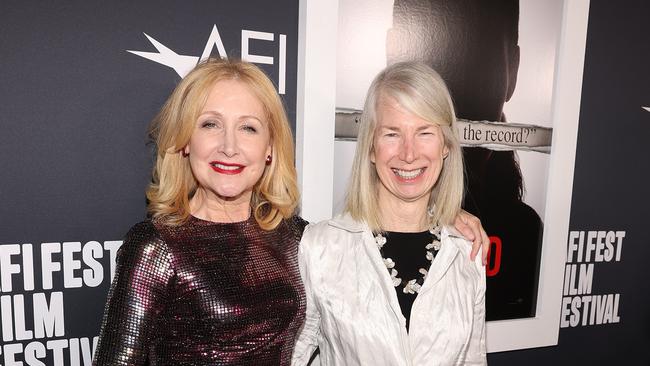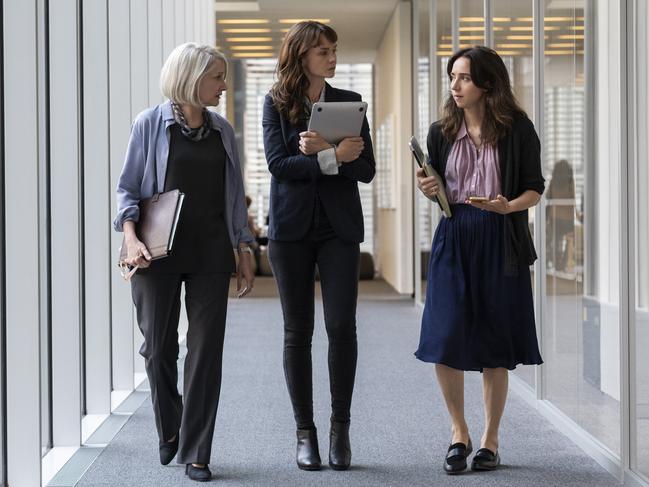Patricia Clarkson plays one of her heroes in She Said
Relishing the role of a fearless newspaper editor in her new film She Said, Patricia Clarkson is every bit as forthright as the women she tends to portray on screen.

Patricia Clarkson is one of Hollywood’s leading character actors. And she is quite a character. Lucille Ball incarnate. When I met her in Toronto in 2009 for her film Cairo Time, she threw herself on to a bed and rolled around chuckling, pleading exhaustion after five days of interviews.
A fascinating mix of Southern charm and New York savvy, Clarkson usually plays women who are nothing like herself. In 2008’s Elegy, she opened the film in a sex scene on top of her co-star, Ben Kingsley. Her role in a Broadway production of The Elephant Man, opposite Bradley Cooper, had her stripping naked on stage eight shows a week. Another role that demonstrates her range was in 1998’s High Art, where she played a German lesbian heroin addict.
“When I received the script, I thought I’m not German, I’m not lesbian and I’ve never even smoked pot,” she says. “But I thought, ‘I know this woman’.”
She was at the Venice film festival in September where her new film Monica was screening in competition. She wasn’t really doing interviews but, when she sees me in the hotel corridor, she beckons to have a chat.
“I’ve been working like crazy,” she says in her husky voice, which indeed recalls Lucille Ball. In addition to her new films She Said and Monica – directed by Andrea Pallaoro, it features trans actor Trace Lysette – she’s just finished shooting a series called Gray, which has Clarkson as a spy.
“We just finished in Toronto and I literally shot till the morning, but I was not missing Venice as Monica is very near and dear to my heart,” she says. “I love Trace Lysette and I love Andrea and I wanted to be here for his film.”
First up for release in Australia is She Said, the English-language debut of Emmy-winning German director Maria Schrader (Unorthodox, I’m Your Man). Carey Mulligan and Zoe Kazan play New York Times reporters Megan Twohey and Jodi Kantor. The film is based on their 2019 best-selling book, She Said: Breaking the Sexual Harassment Story That Helped Ignite a Movement, which chronicles their award-winning investigation of the Harvey Weinstein sexual assault story in 2017.
Clarkson plays their editor at the paper. “I play the great Rebecca Corbett, one of the most influential investigative editors in the history of The New York Times,” she says.
Corbett joined the newspaper in 2004 and edited numerous Pulitzer Prize-winning stories.
“It was a privilege and honour to play such a remarkable human being, who is very intimidating,” she says. “Don’t ever play your heroes, OK!”

Clarkson did not meet Corbett to prepare for the role but she spoke to many people who know her.
“Oh, the way they speak about her. You live for people to speak that way about you.”
She Said had its premiere at the New York Film Festival in October and it has been well received, with critics marking it up for Oscars consideration next year.
Most significant is that the film comes at a time when Weinstein is in court again, on further charges of rape and sexual assault.
Variety notes that, “Schrader’s taut new thriller may be one of the most important movies to hit Hollywood in decades because it dares to ask about the entertainment business’s culpability in Weinstein’s crimes. And that doesn’t just mean the studio executives and publicists who did Weinstein’s dirty work or who opted to work with him in order to keep winning Oscars and reaping box office rewards. No, that also means the journalists and news organisations who may have heard horror stories about the movie mogul and decided it would be too difficult to try to expose the truth.”
Did Clarkson have much to do with Weinstein during her career? “Oh, I did of course. His company Miramax picked up The Station Agent and he was involved with several films that I was in. A complicated man. It’s hard for me to speak, because I wasn’t sexually abused by him. But I think the abuse that so many women suffered has to stay ever present, because you know that they will never recover from it. We can never ever lighten that load. Ever.”
The daughter of a New Orleans politician, Clarkson is often political in her choices of roles and likes film projects that have something to say. Often, they are about brave, fearless women and Monica is no exception. It is the second film in director Pallaoro’s “trilogy of abandonment”. The previous film, Hannah, won Charlotte Rampling the Volpi Cup for best actress at Venice.
Monica was the first film in competition at Venice to feature a trans actress, Lysette, best known from the television series Transparent. Clarkson plays Monica’s dying mother, Eugenia, who seemingly fails to recognise Monica as her former son and mistakes her for a carer. Monica’s brother (Joshua Close) and his wife (Australia’s Emily Browning) are supportive of Monica even as they also find her almost unrecognisable. Monica persists in her efforts to spend time with the mother who rejected her. At what point Eugenia realises Monica’s identity is part of the intrigue.
“Eugenia is a very different character for me,” Clarkson says. “She’s very different from how I was raised, how I was brought up and how I feel. But I still find her a very beautiful character who gives light and hope. And you know, love is love.”
The subtle, beautifully realised film was one of the surprise hits of the Venice festival and is due to open in Australia next year.
“It affected so many people,” Clarkson says. “I can’t walk around anywhere in this town (Venice) right now without people grabbing me and weeping with me about the film. And yes, Trace is the first transgender actress to ever lead a film at Venice, but she’s also just a great actress. To have someone of Trace’s talent and beauty at the centre of this remarkable film I think has really hit people hard. People embrace her and love her. This is a dream come true for her and I’m just kind of riding on her coat-tails.”
Everyone around young Patty, as she is called, knew she would be an actor from the age of 12. After attending a progressive high school theatre club she studied for a drama degree, graduating with honours, and went on to complete a Master of Fine Arts at the Yale School of Drama.
After getting her break in Hollywood in The Untouchables with Kevin Costner in 1987, she came into her own with roles in Todd Haynes’s suburban drama Far From Heaven, opposite her friend Julianne Moore, then a string of movies in 2003 with The Station Agent, All the Real Girls and Pieces of April, for which she earned an Oscar nomination.
Largely avoiding television, she won two Emmys for guest appearances as “crazy Aunt Sarah” on Six Feet Under and played Amy Adams’ overbearing mother in HBO miniseries Sharp Objects.
In her repertoire of roles, there have been a lot of wives and mothers even if, in her real life, she decided from an early age that marriage and kids were not for her.
“I am fiercely independent,” she says. “But I’ve had remarkable relationships and I’ve dated some really exquisite men who have made me a better person.”
She lowers her voice for effect: “Not all, but most!
“Many people in my life are mothers or fathers so I have children in my life and it gives me an objectivity to play many diverse mothers and wives.”
After appearing as a government official in the final two series of House of Cards, this year she received an outstanding actress Emmy for the series State of the Union, a See-Saw Films co-production where she is in marital therapy with Brendan Gleeson.
The youngest of five girls who were all born within six years, Clarkson is the daughter of Arthur (Buzz) Clarkson, a school administrator, and Democrat politician Jackie (Brechtel) Clarkson, who served in the Louisiana House of Representatives and in multiple tenures on the New Orleans City Council.
“She’s 86 and she’s still a powerhouse even if she’s retired now,” Clarkson says. “She’s a very wonderful, big, strong Democratic mother and I grew up in a very accepting, loving and very progressive household and it carried me far in this life.
“I grew up fierce. I grew up with strong opinions. I’ve always had strong opinions. I was a very emotional child and acting gave me an outlet for my passion and my emotions. I think it helped me stay sane.”
Would she like to come and work in Australia? “I’d kill to,” she replies enthusiastically. “I’ve never been, even if I’ve been invited to Australian film festivals many times all the way back to The Station Agent.
“But I was always working, I work too damn much. My dream is to come to Australia, maybe with this film. We want Monica to go to cinemas there.”
Let’s hope so. With her charm and energy, Clarkson would be a hit with Australian audiences.
She Said opened on Thursday.

To join the conversation, please log in. Don't have an account? Register
Join the conversation, you are commenting as Logout